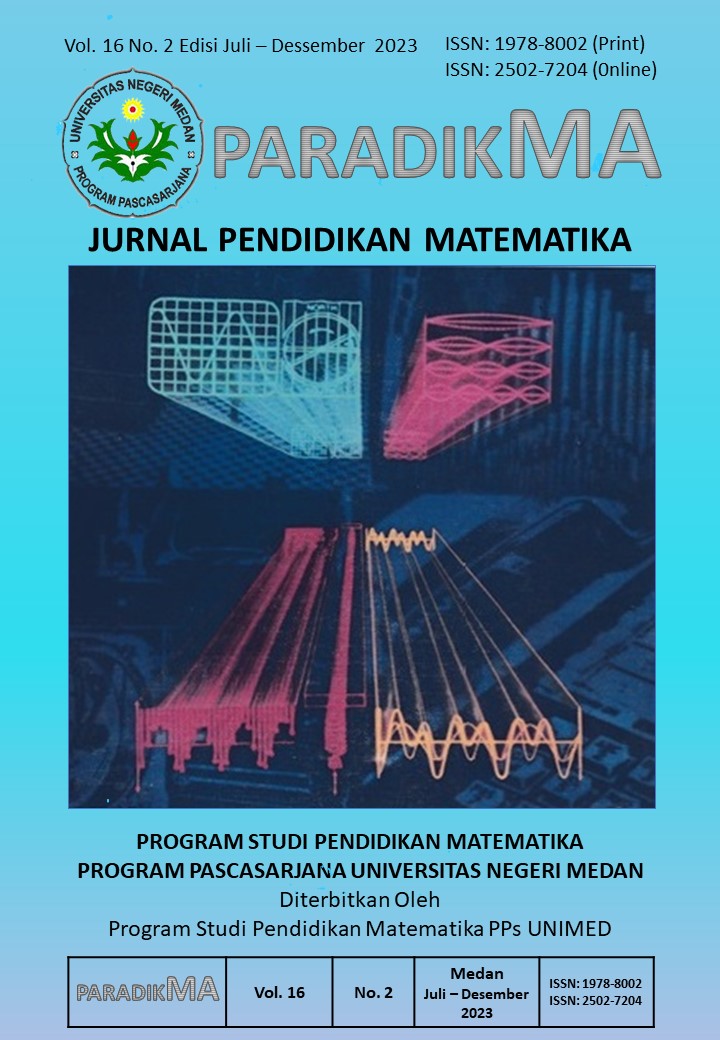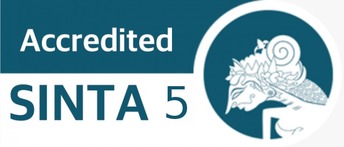The Effect of Problem Based Learning Models on Students' Mathematical Problem Solving Ability and Self Efficacy
DOI:
https://doi.org/10.24114/paradikma.v16i2.48284Abstract
This research aims: (1) to determine whether problem-based learning models improve mathematical problem-solving abilities and self-efficacy; (2) to explore the interaction between students' initial mathematical abilities and the learning model. The study employed a quasi-experimental quantitative design, with ANOVA used for inferential data analysis. Fifty eighth-grade students from SMP Negeri 3 Aek Kuo in the academic year 2022/2023 were examined. The null hypothesis (H0) was accepted, and the alternative hypothesis (Ha) was rejected since the significant F-test value was 0.178 > 0.05, and the T-test value was 0.692 > 0.05, indicating no significant difference in the average scores between experimental classes I and II. PBL students demonstrated better performance in answering mathematical problems compared to those in the direct learning group. Experimental class 1 achieved a mastery level of 84%, while experimental class 2 achieved a mastery level of 64%. PBL learners exhibited higher self-efficacy compared to those learning through direct instruction. Hypothesis testing indicated that students in experimental class 1 had stronger confidence in mathematical problem-solving compared to students in experimental class 2. The problem-based learning (PBL) methodology did not have a significant impact on students' mathematical problem-solving abilities. Hypothesis testing using interaction analysis yielded a significance value of 0.730 > 0.05. Both PBL and students' basic mathematical abilities influenced self-efficacy. Interaction analysis indicated a significance value of 0.000 < 0.05.Keywords: Problem based learning, early math skills, math solving, self efficacyReferences
Darda S. dan Adi S. (2013). The Constitution of the National Education System and Its Application. AR-RUZZ MEDIA.
Firdaus, D.M., Purwanto, S.E., Nuriadin, I. (2021). Contribution of Self-Efficacy and Mathematics Anxiety to Students™ Mathematical Reasoning Ability. International Journal of Progressive Mathematics Education, 1 (2), 85-103.
Gustia, D., Hanifah, Jenab dan Afrilianto, M. (2019). Improving Mathematics Problem Solving Ability and Self Efficacy of Middle School Students Using Contextual Teaching and Learning Approach. Journal of Innovative Mathematics Learning, 2(5), 253-260.
Hajar, S., Bernard, H., & Djam™an, N. (2018). Characteristics of Mathematical Problem Solving Viewed from Students' Cognitive Style. Issues in Mathematics Education (IMED), 2(1), 92-99.
Hasratuddin. (2018). Why You Should Learn Mathematics. Perc. Edra.
Kamarullah. (2017). Mathematics Education in Our Schools. Mathematics Education And Learning, 1(1)., 21-32.
Marlina, dkk. (2019). Improving Communication Skills and Self-Efficacy of Junior High School Students by Using a Discursive Approach. Journal of Diactive Mathematics, 1 (1).
Masri, MF., dkk. (2018). The Effect of Problem-Based Learning Methods on Self-Efficacy and Mathematical Problem Solving Ability in terms of High School Students' Initial Mathematics Ability. JPPM., 11(1), 116“126.
Nurfatanah, Rusmono, N. (2018). Elementary School Students' Mathematical Problem Solving Ability. Journal of National Basic Education Seminar and Discussion Proceedings 2018, ISSN: 2528-5564.
Polya, G. (1973). How to Solve It. Princeton University Press.
Ristanti, F. (2017). Critical Thinking Ability Viewed from the Mathematical Disposition of Students of SMP Negeri 3 Purwokerto. Journal of Mathematics Education., 2, Number 2, 36-47.
Sari, D.P., Syahputra, E. dan Surya. (2018). An Analysis of Spatial Ability and Self-Efficacy of Students in Cooperative Learning by Using Jigsaw at Smas Muhammadiyah 8 Kisaran. American Jurnal of Education Research, 6 (8), 1238-1244.
Setyaningsih, R., & Rahman, Z. H. (2022). The Effect of Problem Based Learning Models on Students' Problem Solving Ability. Axiom: Journal of Mathematics Education Study Program, 11(2), 1606-1619.
Sihombing, Nova A dan Fauzi, A. (2017). P Differences in Mathematical Communication Skills of Students Taught Using the Think Pair Share Cooperative Learning Model with the Think Talk Write Type on Cube and Block Material in Class VIII SMPN 27 Medan. Inspiring Journal, 3 No 2
Simamora, R. E., Saragih, S., & Hasratuddin, H. (2018). Improving Students™ Mathematical Problem Solving Ability and Self-Efficacy through Guided Discovery Learning in Local Culture Context. International Electronic Journal of Mathematics Education. https://doi.org/10.12973/iejme/3966.
Sinaga. C. V. R. (2020). Development of Mathematics Learning Devices. Aswaja Youth Forum.
Sugiyono. (2018). Educational Research Methodology (Quantitative, Qualitative Education and R&D). Alphabet.
Trianto. (2017). Designing an Innovative-Progressive Learning Model. Kencana Prenada Media Group.
Trianto. (2016).Designing an Innovative-Progressive Learning Model: Concept, Foundation, and Its Implementation at the Education Unit Level Curriculum (KTSP). golden.
Widyasari, N., Dahlan, J.A., Dewanto, S. (2016). Improving Middle School Students' Mathematical Disposition Skills through a Metaphorical Thinking Approach. Fibonacci Mathematics Education And Mathematics, 2(2), 28“39.







